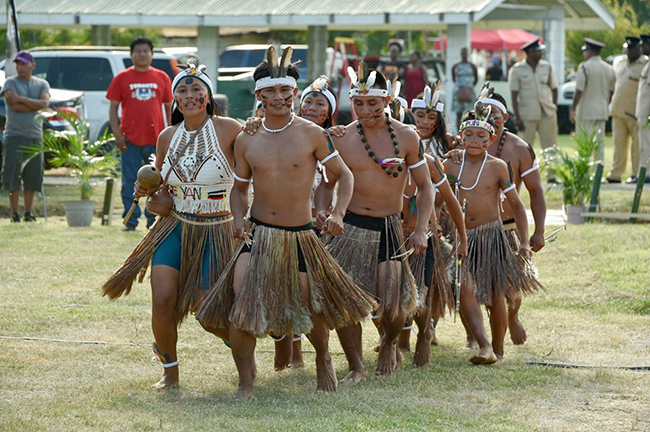Amid ongoing political uncertainty, the National Toshaos Council (NTC) has added its voice to calls for elections to be held even as it reiterated the need for the inclusion of Indigenous Peoples in matters that affect them.
“The Indigenous Peoples of Guyana need to become more and fully engaged in all development projects, programmes and policies that would affect us. We need to know more on the Green State Development Strategy, what is there in oil and gas for us, what will happen in the event of an oil spill, what measures are in place to safeguard our peoples and marine life…,” NTC representative Mario Hastings said as Indigenous Heritage Month was officially launched at the Sophia Exhibition complex yesterday.
“We are uncertain of our political landscape and call for elections to be held soonest so that we can return to normalcy,” he added, speaking to an audience of senior government officials that included President David Granger, Prime Minister Moses Nagamootoo, Vice President and Minister of Indigenous Peoples’ Affairs Sydney Allicock and junior Indigenous Peoples’ Affairs Minister Valerie Garrido-Lowe.
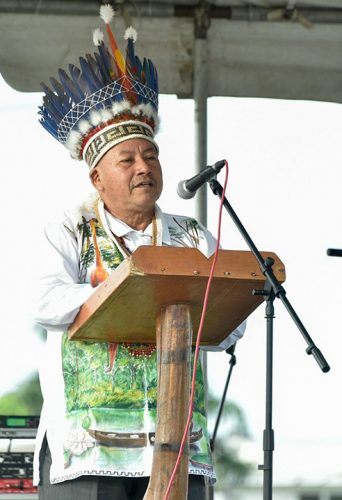
The APNU+AFC government has been deemed a caretaker administration pending the holding of new general elections which should have been held by March 21st this year following the December 21, 2018 motion of no confidence against it.
In responding, Allicock said that government is inclusive and is working with Indigenous communities with a holistic development plan. He added that land issues have to be dealt with in a systemic manner which takes sustainability and futuristic planning into consideration.
Hastings, pointing to problems faced by many communities in the areas of land demarcation and titling, said that many communities are still “highly vulnerable” to land grabs. He said that the situation has worsened because “some of our lands are not yet recognised and exist without land titles and official demarcation and our claims for land extensions move at an unacceptably slow pace.” He called on government to address the issue. “We need our land, our land is our life,” he emphasised.
‘Multi- faceted’
Speaking after Hastings, Allicock focused largely on the land issues mentioned, saying that concerns raised by the Indigenous community have not fallen on deaf ears but if persons observe, they would see a holistic plan in motion.
“You heard the toshao with land rights. This is quite true but we have not given up. Land rights is multi-faceted and while it is important that our policymakers understand the value of space for all life to survive, it is also important that Indigenous Peoples understand that all Guyanese have a right to share in the distribution of our resources. We need to find a middle ground where we embrace this reality,” Allicock said.
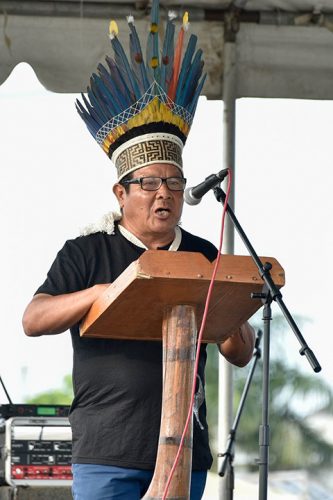
“Many villages have been applying for land extension with no clear vision outlined as to how the land will be used. There are some villages that have inadequately occupied the land they possess but are applying for more. Then, there are those that have outgrown their land space, that have justified their [need for] land space and have applied for additional lands,” he said.
The minister said, however, that “claims for ancestral lands which our fore-parents used from times immemorial to hunt, fish and farm” now need to be supported by a village improvement plan (VIP) that defines plans for occupation of the land.
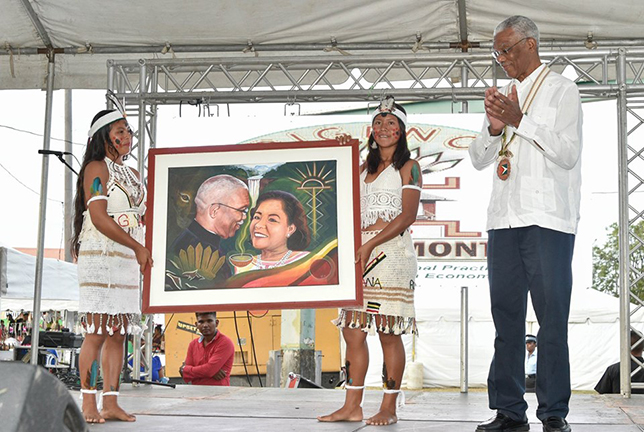
“What do you do with the land? Your VIPs are needed. It is only you that will be able to know what your most valuable resources are and what kind of resources will be most benefitting to you. We have to be able to understand that we have to better plan. We have to be able to develop a land management plan to keep us properly organised so that 100 years from now, we would still be able to have our lands bringing benefits to us; the protection of our species, the protection of the forests and the protection of us,” Allicock said.
Hastings had lamented that while government is working hard to support Indigenous Peoples’ development, there is “yet a long way to go and much more to be done” to curb the many disadvantages that Guyana’s first peoples face on a daily basis.
“We need quality education, and improved health services. Communication needs to be in place, and our many roads need improvement. Social and legal services are still missing for most part in our communities and hence, access to justice is at a low ebb. We need to integrate free, prior and informed consent into our good governance village practices in order to stamp out exploitative business deals, mining and land deals from negatively affecting our peoples,” he said.
“We need to better know and uphold our rights under the Guyana Constitution and to make legislative changes in those laws that are deficient in granting rights to Indigenous Peoples. We suffer from serious pollution and despoiling of our waters and lands from bad mining practices with some of our main rivers and lifelines dying before our very eyes. We enjoy the freedom of our landscapes and our resources but suffer from the financial poverty and lack of opportunity, and we still bear the brunt of discrimination and derogative remarks aimed at us because we are Indigenous,” he added.
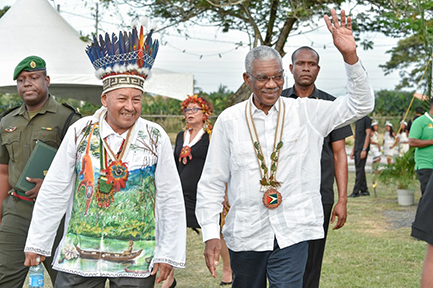
He said that the NTC is still very hopeful that government will sooner rather than later address these problems and continue to work assiduously with them towards the betterment for Guyana’s first peoples.
Meanwhile, Allicock stressed that he wants the Indigenous community to know that his government is supporting them on issues they have highlighted as the APNU+AFC government makes their plans after listening to what the people want since they understand that only they can best articulate their individual and community’s needs.
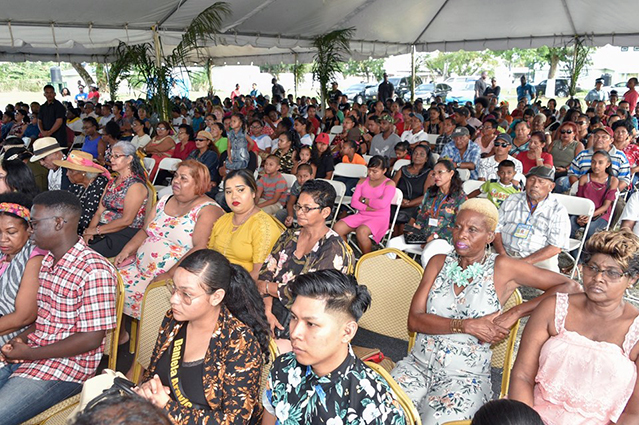
“We do not want to want to deprive you of your land. Instead, we are encouraging efficient land management of our resources in our country with a growing population and rapid development. Our development depends on our ability to manage and sustain our resources,” he said.
“In almost every village, there is an abundance of natural resources. Our projects should be modeled and managed by us. What plans do we have for the growing population? What plans do we have for appropriate education for our young people so that our village will be organised? We are listening to you,” he added.
Allicock said that government has made significant strides in improving the quality of life for Indigenous peoples and it should be celebrated. “We have done a lot of things which is why we must celebrate hard,” he said.
